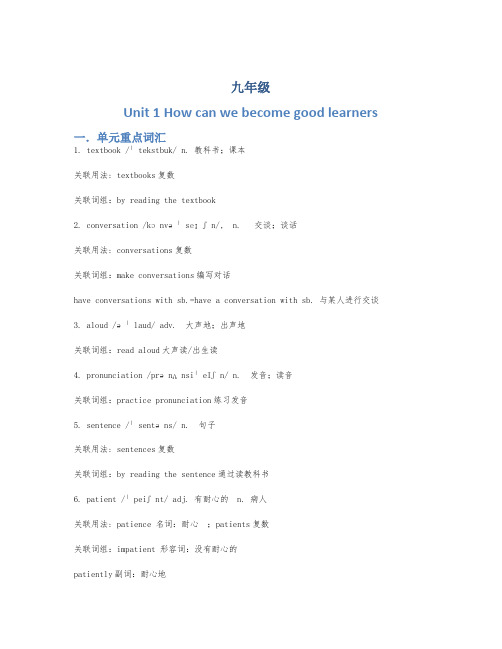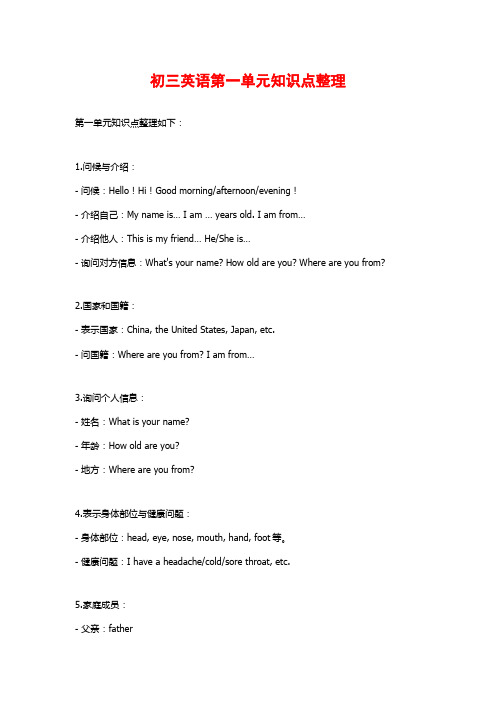九年级英语第一单元知识点
人教版新目标初三英语九年级第一单元单词语法知识点总结

九年级Unit 1 How can we become good learners一.单元重点词汇1.textbook /ˈtekstbuk/ n. 教科书;课本关联用法: textbooks复数关联词组:by reading the textbook2.conversation /kɔnvəˈs eɪʃn/, n. 交谈;谈话关联用法: conversations复数关联词组:make conversations编写对话have conversations with sb.=have a conversation with sb. 与某人进行交谈3.aloud /əˈlaud/ adv. 大声地;出声地关联词组:read aloud大声读/出生读4.pronunciation /prənʌnsiˈeIʃn/ n. 发音;读音关联词组:practice pronunciation练习发音5.sentence /ˈsentəns/ n. 句子关联用法: sentences复数关联词组:by reading the sentence通过读教科书6.patient /ˈpeiʃnt/ adj. 有耐心的 n. 病人关联用法: patience 名词:耐心;patients复数关联词组:impatient 形容词:没有耐心的patiently副词:耐心地be patient with sb.对某人有耐心be patient of sth.对某事能容忍have (no) patience with…对…(没)有耐心lose patience with 对…失去耐心out of patience 没有耐心7.expression /ikˈspreʃn/ n. 表达(方式);表示关联用法:expressions复数关联词组:facial expressions 面部表情8.discover /dIˈskʌvə (r)/ v. 发现;发觉关联用法:discovery 名词:发现9.secret /ˈsi:krət/ n. 秘密;adj. 秘密的;保密的关联用法:secrets复数关联词组:in secret秘密地;keep a secret保密;a secret plan秘密的计划10.look up (在词典,参考书中或通过电脑)查阅;抬头看11.fall in love with 爱上;与⋯⋯相爱12.grammar /ˈgræmə (r)/ n. 语法关联词组:in grammar在语法方面13.repeat /riˈpi:t/ v. 重复;重做关联用法:secrets复数关联词组:repetition名词:重复14.note /nəut/ n. 笔记;记录 v.注意;指出关联用法:notes复数关联词组:please note 清注意;take notes记笔记15.pal /pæl/ n.朋友;伙伴关联词组:penpal笔友16.physics /ˈfiziks/ n. 物理;物理学关联单词:adj. 物理的;身体的;物质的;根据自然规律的,符合自然法则的关联词组:Space Physics 空间物理学物理空间空间物理17.chemistry /ˈkemistri/ n. 化学关联词组:Organic Chemistry 有机化学18.memorize /ˈmeməˌraɪz/ v 记住;记忆关联单词:memory n.记忆关联用法:过去式 memorized过去分词 memorized现在分词 memorizing第三人称单数memorizes典型例句:Have you memorized your lines for the play yet?你记住剧本中的台词了吗?19.pattern /ˈpætn/, /ˈpætən/ n.模式;方式20.pronounce /prəˈnaʊns/ v. 发音关联用法:过去式 pronounced过去分词 pronounced现在分词pronouncing第三人称单数 pronounces关联词组:Pronounce correctly 发音正确正确发音典型例句:I can not pronounce correctly 我不能正确发音21.increase /Inˈkri:s/ v. 增加;增长关联用法:过去式 increased过去分词 increased现在分词 increasing复数 increases第三人称单数 increasesn. 增加;增多;增长关联词组:increase by 增加了;按…增长on the increase 正在增加,正在增长22.speed /spi:d/ n.速度 v.加速关联单词:speeding超速关联用法:过去式 sped或speeded过去分词 sped或speeded现在分词 speeding关联词组:speed up 加速加快速度使加速加快speed limit 速度限制时速限制限速最高车速23.partner /ˈpa:(r)tnə (r)/ n. 搭档;同伴24.born /bɔːn/ v.出生 adj.天生的关联词组:be born with 天生具有born yesterday 乳臭未干典型例句:Swift was born in 1667.斯威夫特生于1667年。
九年级英语上册重要知识点总结

九年级英语上册重要知识点总结Document serial number【NL89WT-NY98YT-NC8CB-NNUUT-NUT108】九年级英语上册第一单元重要知识点总结九年级英语上册第一单元重要知识点总结Unit1一、知识点:在旅馆的登记入住。
ut:在旅馆结账离开。
2.By:①通过…..方式(途径)。
例:IlearnEnglishbylisteningtotapes.②在…..旁边。
例:bythewindow/thedoor③乘坐交通工具例:bybus/car④在……之前,到……为止。
例:byOctober在10月前⑤被例:Englbymanypeople.3.how与what的区别:how通常对方式或程度提问,意思有:怎么样如何,通常用来做状语、表语。
what通常对动作的发出者或接受者提问,意思为什么,通常做宾语,主语。
①Howisyoursummerholiday?It’sOK.(how表示程度做表语)②Howdi dyoutravelaroundtheworld?Itravelbyair.③Whatdoyoulearnatschool?IlearnEnglish,mathandma ubjects.①What……?How…like…?②What…dowith…?How…dealwith…?③What…likeabout…?How…like…?④What’stheweatherliketoday?How’stheweathertod ay?⑤Whattodo?Howtodoit?e.g.Whatdoyoubook?=Howdoyoulbook?Idon’tknowwhatIshoulddowatter.=Idon’tknowhowIs houlddealwWhatdoyoulikeaboutChina?=Howdoyoula?Idon’tknowwhattodonextstep?=Idon’tknowhowtodoi tnextstep?㊣Whatgood/badweaday!(weather为不可数名词,其前不能加a)㊣Whatafine/baddaday!(day为可数名词,其前要加a)4.aloud,loud与loudly的用法:三个词都与"大声"或"响亮"有关。
九年级英语上册各单元知识点归纳

九年级英语上册各单元知识点归纳第一单元:基础知识1. 介词短语的使用:介词短语是由一个介词和它的宾语组成的短语,用来表示时间、地点、方向、原因等。
例如:"on the table"(在桌子上),"in the park"(在公园里)。
介词短语在句子中作状语、定语、宾语等。
需要注意介词与宾语之间的搭配。
2. 动词的时态和语态:英语中的动词有多种时态和语态。
常见的时态有一般现在时、一般过去时、一般将来时等。
常见的语态有主动语态和被动语态。
时态用于表示动作发生的时间,语态用于表示动作的执行者。
例如:"She is reading a book."(她正在读一本书)。
需要注意时态和语态的用法和变化规则。
3. 名词的单复数形式:英语中的名词有单数和复数形式。
复数形式一般是在名词后面加-s或-es。
有些名词的复数形式较特殊,需要记忆。
例如:"a cat"(一只猫)的复数形式是"cats"(多只猫)。
需要注意名词的单复数形式在句子中的搭配和用法。
第二单元:阅读理解1. 完型填空:完型填空是一种考察学生对语境理解和词汇运用能力的题型。
在完型填空中,通常给出一篇文章和一些空格,要求学生根据文章内容和语境选择正确的单词或短语填入空格中。
通常需要结合文章整体逻辑和上下文意义来填写正确答案。
2. 阅读理解题:阅读理解题是一种考察学生阅读理解能力和推理能力的题型。
通常会给出一篇短文或文章,然后根据文章内容提出一些问题,要求学生根据文章内容和推理来回答问题。
需要学会熟练阅读和理解文章,抓住关键信息和主题,并能运用推理等能力来回答问题。
第三单元:语法知识1. 直接引语和间接引语:在英语中,当我们引述别人的话时,可以使用直接引语和间接引语。
直接引语是直接引用别人所说的话,使用引号将其包围;间接引语是将别人所说的话转述出来。
例如:直接引语:"I am happy," she said.(她说:“我很开心。
(完整版)九年级英语第一单元知识点归纳总结-打印

九年级英语第一单元知识点归纳总结短语归纳Section A Section B1. work with friends 与朋友学习/工作2. make words cards 制作单词卡3. read the textbook 读课本4. listen to tapes 听磁带5. ask sb. for help 向某人寻求帮助6. study for a test 为考试而学习7. learn a lot/ a little 学到许多/一点8. work/study with a group 小组学习9. watch videos 看录像10. have/ make a conversation with sb. 和某人谈话/对话11. read aloud 大声朗读12. be patient 耐心点be patient with sb. 对某人有耐心be patient of sth. 对某事有耐心反义词:impatient13. practice sth. / doing sth. 练习某事/做某事14. in that way 用那种方式15. improve my speaking skills提高我的说的技能speaking/reading/writing/listening skills口语/阅读/写作/听力技能16. spoken English 英语口语written English 英语书面语17. a little nervous 有点紧张18. finish sth. /doing sth. 完成某事/做完某事finish reading a book 读完一本书19. give a report 作报告20. a very slow reader 一个读书很慢的人21. get the main ideas 理解/弄清大意1. pronounce some the words读某些单词2. understand spoken English 明白英语口语3. increase to/by 增加到/了4. at the speed of ……的速度at full speed 全速increase my reading speed 提高我的阅读速度5. spell English words 拼写英语单词6. make mistakes in sth. 在某方面犯错误make mistakes in grammar 在语法方面犯错误mistake sb. for sb. 错把某人当成他人mistake sth. for sth. 错把某物当成他物by mistake 错误地7. get the pronunciation right 使发音正确;正确地发音8. get much writing practice 作许多写作练习9. join an English language club加入英语俱乐部10. have a partner to practice English with有一个练习英语的伙伴11. become a successful learner成为一个成功的学习者12. be born in/on+时间出生于……13. be born with 天生具有……14. the ability to do sth. 做某事的能力15. create v.创造—creation n.创造力—creative adj.有创造力的16. active adj.活跃的—activity n.活动17. whether or not 是否18. depend on 依赖,由……决定19. have sth. in common 有……共同点22. read word by word 一字一字地读23. read word groups 读词组/意群24. guess the meaning of the word 猜测这个单词的意义25. learn to do sth. 学会做某事26. learn sth. from sb. 向某人学习learn to learn English 学会学英语learn from mistakes 从错误中学习27. be like a bad dream 像一个恶梦28. most of the time 大多数时间29. find it adj. to do sth. 觉得做某事……30. find sb./sth. doing发现某人正在做某事/发现某事正在发生31. be afraid to do sth. 害怕做某事be afraid of doing sth. 担心出现某种后果Eg: I am afraid to climb trees because I am afraid of falling down from the trees.我害怕爬树,担心从树上掉下来。
(完整版)九年级英语上册第一单元知识点总结

九年级英语上册第一单元知识点总结九年级英语上册第一单元知识点总结Unit 1一、知识点: 在旅馆的登记入住。
ut: 在旅馆结账离开。
2.By: ①通过…..方式(途径)。
例:I learn English by listening to tapes.②在…..旁边。
例:by the window/the door③乘坐交通工具例:by bus/car④在……之前,到……为止。
例:by October在10月前⑤被例:Englby many people.3.how与what的区别:how通常对方式或程度提问,意思有:怎么样如何,通常用来做状语、表语。
what通常对动作的发出者或接受者提问,意思为什么,通常做宾语,主语。
①How is your summer holiday? It’s OK.(how表示程度做表语)②How did you travel around the world? I travel by air.③What do you learn at school? I learn English, math and maubjects.① What……? How…like…?② What…do with…? How…deal with…?③ What…like about…? How…like…?④ What’s the weather like today? How’s the weather today?⑤ What to do? How to do it?e.g. What do youbook?=How do you lbook?I don’t know what I should do watter.=I don’t know how I should deal wWhat do you like about China?=How do you la?I don’t know what to do next step?=I don’t know how to do it next step?㊣ What good / bad weaday!(weather为不可数名词,其前不能加 a )㊣ What a fine / bad daday! (day为可数名词,其前要加 a )4. aloud, loud与loudly的用法 : 三个词都与"大声"或"响亮"有关。
人教版九年级英语Unit1知识点总结

Unit1 How can we become good learners?一、语法点:介词by的用法1. by doing sth. 通过做某事的方式eg: —How can you improve your pronunciation? —By listening to tapes.2. 表示传达、传递的方式或媒介eg:How did you tell him about it, by letter or by e-mail?3. by + 交通工具eg: Every day I go to school by school bus.4. 在……的旁边eg: I’m sitting by the lake.5. 不迟于、在…之前eg: Please come home by 10 p.m.6. 创作eg: I have already read the book by Mo Yan.二、知识点1. by asking the teacher for help①by 介词通过,表示通过某种方式by doing sth. 通过做某事的方式eg: We visited Beijing University by riding bikes last weekend.②与ask相关的短语ask sb. for sth. 向某人要某物eg: He always asks his parents for money.ask sb. about sth. 向某人询问某事eg: Can I ask you about the result of test?ask sb. ( not) to do sth. 要求某人(不)做某事eg: My mother asks me not to play in the street.2. Do you have conversations with friends in English?have conversations with sb. = have a conversation with sb.与某人交谈/谈话make a conversation 编对话3. What about reading aloud to practice pronunciation?①aloud adv. 大声地;出声地eg: We should read English aloud. 我们应该大声读英语②practicev. 练习practice doing sth. 练习做某事eg: They practice speaking English every morning.n. 练习(不可数名词)eg: Students get practice in the English club.4. I’ve learned a lot (in) that way.in this/that way 用这种/那种方式5. Don’t read word by word.①word by word 一个字一个字的eg: He often read English word by word.②和word by word类似的短语有:day by day 一天天地one by one 一个一个地6. Well, be patient. It takes time.patientadj.耐心的①be patient with sb. 对某人有耐心eg: Our teachers are patient with us.②be patient to do sth. 有耐心做某事eg: Teachers should be patient to teach students.n. 病人eg: There are many patients in the hospital.7. The more you read, the faster you’ll be.the+比较级,the+比较级越…… 越……eg: The more you practice, the better you can understand.8. Why did Wei Fen find it difficult to learn English?find it + adj. + (for sb.) + to do sth. 发现做某事(对于某人)是…make it + adj.+ (for sb.) + to do sth. 使(某人)做某事成为…think it + adj. + (for sb.) + to do sth. 认为做某事(对于某人)是…feel it + adj. + (for sb.) + to do sth. 感觉做某事(对于某人)是…eg: Computers make it easier to keep in touch with friends.电脑使我们获得消息更容易了。
九年级英语第1单元-知识点总结

九年级英语第1单元-知识点总结第一部分:基础词汇和短语1. Greetings and Introductions在英语中,问候和介绍是日常生活中常用到的交际用语。
常见的问候方式包括:“Hello!”、“Hi!”、“Goodmorning/afternoon/evening!”等。
而自我介绍的常用表达为“I am...”、“My name is...”等。
2. Classroom English在教室里,学生和老师之间的交流需要使用一些特定的英语表达。
例如,“May I come in?”、“May I go to the washroom?”、“Can you repeat that, please?”等。
3. Numbers and Dates数字和日期是我们日常生活中无法绕开的内容。
需要掌握基本的数字、基数词、序数词等,以及日期的表达,例如“Today is...”、“It's Monday.”、“My birthday is on October 15th.”等。
4. Time谈论时间也是英语学习的重要内容,掌握“in themorning/afternoon/evening”、“at 9 o'clock”、“from...to...”等表达方式非常实用。
5. School Subjects and Facilities学校科目和设施是我们在学校中经常需要提及的。
诸如“Mathematics”、“Science”、“Library”、“Computer lab”等词汇需要熟练掌握。
6. Adjectives and Adverbs形容词和副词是用来描述人、事物和行为的重要词汇。
例如“beautiful”、“kind”、“quickly”、“carefully”等。
第二部分:语法知识点1. Simple Present Tense学习现在时态是英语学习的基础。
在这一时态中,主语和动词的形式要保持一致,例如“I play football.”、“He dances well.”。
初三英语第一单元知识点整理

初三英语第一单元知识点整理第一单元知识点整理如下:1.问候与介绍:- 问候:Hello!Hi!Good morning/afternoon/evening!- 介绍自己:My name is… I am … years old. I am from…- 介绍他人:This is my friend… He/She is…- 询问对方信息:What's your name? How old are you? Where are you from?2.国家和国籍:- 表示国家:China, the United States, Japan, etc.- 问国籍:Where are you from? I am from…3.询问个人信息:- 姓名:What is your name?- 年龄:How old are you?- 地方:Where are you from?4.表示身体部位与健康问题:- 身体部位:head, eye, nose, mouth, hand, foot等。
- 健康问题:I have a headache/cold/sore throat, etc.5.家庭成员:- 父亲:father- 母亲:mother- 兄弟姐妹:brother, sister- 祖父母:grandfather, grandmother6.职业:- 医生:doctor- 教师:teacher- 学生:student- 工程师:engineer,等等。
7.学科与科目:- 英语:English- 数学:Math- 历史:History- 地理:Geography8.时间和星期:- 时间:What time is it? It is … o'clock.- 星期:Monday, Tuesday, Wednesday, Thursday, Friday, Saturday, Sunday9.课程表达:- 上课:have classes, have English/Math/History class- 做作业:do homework10.日常活动和爱好:- 做早操:do morning exercises - 看电视:watch TV- 打篮球:play basketball- 弹吉他:play the guitar。
- 1、下载文档前请自行甄别文档内容的完整性,平台不提供额外的编辑、内容补充、找答案等附加服务。
- 2、"仅部分预览"的文档,不可在线预览部分如存在完整性等问题,可反馈申请退款(可完整预览的文档不适用该条件!)。
- 3、如文档侵犯您的权益,请联系客服反馈,我们会尽快为您处理(人工客服工作时间:9:00-18:30)。
新人教版英语九年级1—14 单元知识点Da Wan Middle School of Jing yuan countyMr. ZhangU nit1 How can we become good learners?一,本单元要求学生学会的知识点:2. 学会运用by+doing的结构表达做事的方式,by “通过……方式或途径”,译成“靠、通过”。
By 后面可以加名词或动名词短语。
3.动名词的结构:动词后加ing相当于名词,在句中可以做主语、宾语、表语、定语等。
二,language points (1)1, I study by working with a group.我通过小组活动来学习。
By为介词,用法很多。
请仔细观察下面的例句,分析by的用法,然后补全结论部所缺的内容。
【例句】1). Come and sit by us 2) Peter goes to work by bus every day.3) Tony will come back by 10:00 pm. 4) English is spoken by lots of people5) My brother studies history by working with a group.【结论】1) by 可以表示位置,(1)_____________,如句1 也有“从……旁边(经过)之意”。
2)by 可以表示交通、传递等的方式,如句23)by 可以表示时间,“到(某时)之前,不迟于”,如句34)by 可以用于构成(2)___________ ,“被、由”如句45)by 可以表示方式或手段,(3)“______________”结构在句中做方式状语,“通过……方式(手段)”或“借助……手段”,如句5【运用】根据提示,用含有by 的短语完成句子。
1) Annie went to Beijing ___________(乘火车)yesterday。
2) His grandfather made a living ________________(靠卖水果) in the past.3) The scientists have to arrive at the village____________(八月以前)。
4) Allen goes _________________(经过邮局) on his way to school every morning.5) The book was written ________________(由几个工程师)。
2.What about reading aloud to practice pronunciation.1)词语辨析:aloud loud loudlyAloud : 出声地、大声地。
常与read,call等词连用。
不用于比较级。
e.g Don’t read aloud in thelibrary .loud 大声地、喧闹地。
指说话声和笑声,常与talk/speak/laugh/sing等词连用,常用比较级。
例如: We can’t hear you ,Please speak louder.Loudly 高声地、喧闹地。
可以与loud互换,含有吵闹的意思2) What about /How about……?后跟名词、代词或动词ing用于征求意见。
3. It’s too hard to understand spoken English.句中的it是形式主语,不定式短语to understand spoken English 是真正的主语。
该句的句型为:It’s +too +adj+(for sb.)+ to do sth.意思是:(对某人来说)做某事是太……的。
如;: It’s too important to keep healthly.It’s difficult for him to learn two languages.【链接】Too …...to…结构常表示“太……而不能……”,too后面接形容词或副词,to 后面接动词原型。
如:The room is too dirty to live in .He walks too slowly to get there on time.【运用】将下列句子翻译成英语。
1)孩子们在那条河里游泳是危险的。
2)晚饭后散步太有必要了。
3)水太烫,不能喝。
【EXERCISES】1. Choose the best answer.1) He goes to school _______ bike. A. by B. on C. in D. at2) ---- How do you study English so well ?----- By ______ lots of booksA. readB. lookC. watchingD. reading.2. Compete the following sentences.1) 大声朗读来练习发音怎么样?What about____________ to practice pronunciation ?2) 她通过读课本来学习英语。
She studies English ____________the textbook.3)She improves her English _______________________(通过加入英语俱乐部)3. 翻译1)老师要求我大声朗读课文。
2) 不要这么大声,婴儿在睡觉。
3)我爸爸经常开车去上班。
【Writing】How do you study English?The Second PeriodLanguage points(2)1. Why did Wei Fen find it difficult to learn English?Find it difficult /hard to do sth. 发现做某事很困难。
【 Find用法归纳】Find sb doing sth. 发现某人做某事Find it +adj+ to do sth 发现做某事很……Find it +adj+ to do sth 中的it 是形式宾语,adj做宾补,to do sth 是真正的宾语,同类的词还有 think ,feel consider等【活学活用】1) I found it ____________(interest) to talk with my grandfather2) I found it hard for me ________(improve) spoken English.2. But I was afraid to ask question because of my poor pronunciation .Be afraid to do sth. 害怕去做某事。
【Afraid 用法归纳】be afraid of sth/ doing sth . 害怕做某事(担心出现某种不良后果)be afraid to do sth. 害怕去做某事,(“怕”或“不敢”去做某事)be afraid that 恐怕……(礼貌地说出令人不快、失望或感到遗憾的事)【活学活用】1)Tine is so shy that she is afraid of _______in front of a group.A. to speakB. speakC. speakingD. spoke3.Then one day I watched an English movies called Toy Story.Called=named 叫做……【 Call的用法归纳】Call sb=telephone sb=phone sb.=give sb.a call.=ring sb.Call on sb 拜访某人4.I discovered that listening to something interesting is the secret to languagelearning.本句是一个复合句,that引导宾语从句。
在宾语从句中listening to something interesting 是动名词短语作主语,所以谓语动词用单数形式。
例如: Watching TV too much is bad for your eyes.Something interesting 意为“有趣的事情”形容词修饰不定代词是要置后,(后置定语)。
例如: Ihave something important to tell you .Discover 发现(指偶然或经过努力发现来源于客观存在但不为人所知的事物)5. but because I wanted to understand the story , I looked them up in a dictionary.Look up (通过词典、电脑)查阅、抬头看。
【 Look用法归纳】Look after 照顾look like 看起来像 look out 当心、小心look through 浏览 Look for 寻找look forward to 期待look around 向四周看 look over 检查 Have a look看一看【词组归纳】发现做某事很难 find it difficult to do sth语言学习的秘密 the secret to language learning害怕做某事 be afraid to do sth爱上fell in love with肢体语言 body language脸上的表情 the expressions on the faces关键字 key words对……感兴趣 be interested in ….在词典里查找单词 look them up in a dictionaryThe third periodLanguage points(3)Grammar一动名词定义:它是一种兼有动词和名词特征的非谓语动词形式。
基本形式: V+ing作用:动名词具有名词的性质,在句中可以做主语、宾语、表语、定语等动名词的基本用法:1.用作主语。
所表示的动作比较抽象,或者泛指习惯性地动作。
例如: Playing with fire is dangerous.注意:动名词做主语,有时先用it做形式主语,把动名词置于句尾。
这种用法在习惯句型中常用。
1)It is no use /good / useless+doing…2)It’s a waste of time+doing….3)It’s fun+doing….在以上结构中常用动名词作主语。
